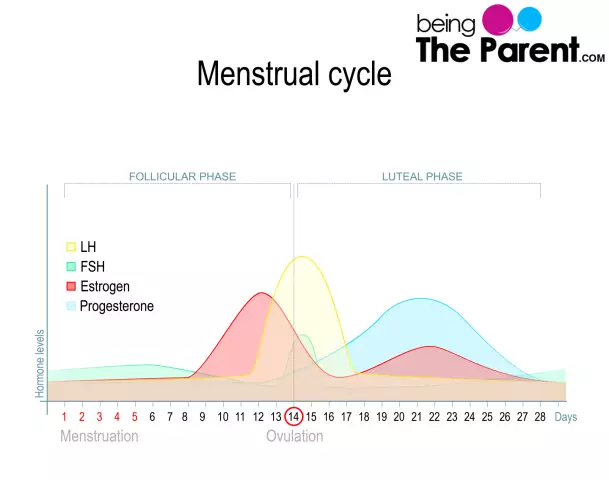- Author Curtis Blomfield blomfield@medicinehelpful.com.
- Public 2023-12-16 20:44.
- Last modified 2025-01-23 17:01.
Everyone at least once heard the phrase "sit on hormones." But few people thought about what hormones are and why they are needed. Let's figure it out. So, hormones are chemicals produced by various organs of the human body, the main difference of which is the ability to influence the cells of various parts of the body in a certain way. The human body produces a huge variety of hormones every day. We will talk about such a hormone of the female reproductive system as progesterone.

This is a hormone whose name was formed after the merger of Latin words. The literal translation of the name is as follows: "for or in the name of pregnancy." It is to ensure the normal development of the fetus throughout pregnancy that the hormone progesterone is needed. This is its main, but not the only function.
Main functions of the hormone progesterone
As mentioned above, the main function of the hormone is to maintain pregnancy, especially in the first trimester. What processes take place in the body under the influence of suchhormone like progesterone? This is primarily the preparation of the body for the upcoming pregnancy. Produced in large quantities after ovulation, progesterone reduces a woman's immunity, which is essential

o so that the mother's body does not reject the fertilized egg. Also, under the influence of this substance, the tone of the uterus and the growth of its internal cavity stop, which, in turn, also contributes to the successful implantation of the embryo. In a favorable case of pregnancy, progesterone promotes the formation of the placenta from the uterine mucosa. As you can see, the hormone affects not only the metabolism, but also the physical condition of a woman.
Norms
Depending on the phase of the cycle, the content of the hormone progesterone changes. This is due to the needs of the body.
| Cycle phases | 1. Ovum maturation | 2. Ovulation | 3. Corpus luteum phase |
| ng/ml | 0, 15-1, 1 | 0, 7-1, 6 | 1, 5-2, 6 |
These norms are set for women of childbearing age. But after the onset of menopause, the rate of this hormone is much lower - up to 0.2 ng / ml. The norms of this hormone during pregnancy are completely different. So in the first trimester, normally up to 48.6 ng / ml should be produced, in the second trimester there is an increase in progesterone production to 51.7 ng / ml. The highest production of this hormone is recorded in the third trimester of pregnancy - up to 91.4 ng / ml.
Deviations from the norm
The hormone progesterone is produced not only by the corpus luteum, formed at the site of a bursting follicle in women, but also by the adrenal glands. In men, this hormone is also produced by the seminal vesicles. A lack of progesterone in women can lead to miscarriage or spontaneous miscarriage, as well as signal the presence of ovarian or adrenal cancer. In men, the lack of such a hormone can cause a decrease in sexual desire, as well as cause diseases such as:
- Pseudo-hermaphroditism.
- Prostate hyperplasia.
- Impotence.
- Testicular or adrenal cancer.

As you can see, it is very important to monitor the level of such a hormone as progesterone. A high level of this substance is also a very dangerous sign that will require immediate investigation and elimination of the causes.






